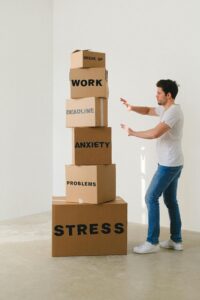Coping with Anxiety: Effective Strategies
Anxiety is an experience that affects millions of people all over the world. Here in Katy and Houston, close to half of my clients suffer from some form of apprehension, worry or fear. Anxiety can range from mild unease to overwhelming panic, and it can feel as if the whole world is collapsing underneath you.
Anxiety doesn’t have to control your life though. With the right strategies, you can manage and even reduce your levels of apprehension and worry. But first, what exactly is anxiety?)
What exactly is anxiety?
If you lived in a cave a few thousand years ago, chances are you had to fight for your survival. There was an occasional tiger coming your way, or you had to be careful not to step on spiky bushes or a venomous snake. You had to constantly be alert and for a good reason. Once a danger is perceived, your sympathetic nervous system kicked in and alerted you to tense your muscles, clinch your jaw, raise your heart rate and be ready to fight or flee from danger. Occasionally, the freeze response may have been the best, for example with that pesky snake. No sense running away from a giant cobra that would likely slither faster than you.
Let’s fast forward to today’s society. Things have changed quite a bit, to say the least. Most of us don’t have to contend with fierce animals, but our anxiety prevails. Why? Because evolution has made us adapt to the environment, but our nervous system doesn’t know the difference. Biologically speaking, the anxiety doesn’t distinguish in between real physiological danger, and work deadlines, nagging spouses or speaking in front of a group.
Before we jump to solutions, let’s look at reasons we are anxious
What makes us prone to anxiety?
Personality Styles:
Perfectionism – High expectations about yourself, others and life. When everything falls short, you become disappointed and/or critical
Excessive Need for Approval – An inner sense of being flawed or unworthy. Leads to a mistaken belief that you are unacceptable just the way you are. You are constantly seeking validation
Excessive Need for Control – You want everything in life to be predictable.
Poor mind-body awareness – You either ignore physical or psychological signs of distress, or you are hypervigilant to any minor aches and pains.
Conflict avoidance and lack of assertiveness. – Reluctance to assert your opinions and voice your needs tends to more difficult situations (e.g. avoiding your boss for ambiguous directions will likely lead to more confusion and uncertainty at work).
Upbringing:
Overprotective parents – Your parents didn’t let you fail as a child/teenager, and now you’re struggling with challenges and adversity. I can’t tell you how many times I have 20 something year olds in my office that are too afraid to call the doctor themselves, drive, meet a friend or deal with a disappointing grade in college.
Poor self-esteem – Low self-confidence breeds anxiety in that you don’t believe you can accomplish anything. You fear that if you try, you are doomed to failure. Check out my blog Self-Esteem Building Toolkit for much more detailed information for how to significantly improve your self-esteem – and decrease anxiety in the process.
Culture – Growing up in a different environment with different norms and expectations
Conflicting messages – Parents that are inconsistent in the messages that they project to their kids, or have different parenting styles can also breed anxiety.
Bullying/lack of acceptance – Not feeling welcome by your peers is another factor that can lead to anxiety and low self-esteem.
Heredity:
Studies have shown that some individuals have legions in their brain that get activated more easily with certain stimuli.
Solutions to reducing your anxiety
From a biological perspective, we want our parasympathetic nervous system to kick in as soon as possible when we experience a perceived danger. The sympathetic nervous system kicks in to “protect” you from danger, while the parasympathetic nervous calms things down once the “danger” is averted.
However, with chronic stress, we also want to establish habits in place that are preventative, that actually rewires our brain – our neuroplasticity if you will – and make us react less to perceived dangers on a regular basis. Most of the suggestions below are not magic solutions that would work if you do them a couple of times, but rather habits that you would like to incorporate into your life on a regular basis.
Take some time to identify your anxiety triggers. Are there specific situations, people, or thoughts that make you anxious? Keeping a journal can be a helpful way to track these patterns. Understanding the root causes of your anxiety is crucial for effectively managing it. At times you may need the help of a qualified mental health professional if these causes are deeper and not easily assessable.

1. Start Your Day with a Calm Routine
- Morning Meditation: Begin your day with a few minutes of meditation or deep breathing exercises to set a calm tone for the day. Listen to your body without judgement and let go of any expectations.
- Limit News and Social Media: Avoid diving into stressful news or social media first thing in the morning. Instead, focus on positive or neutral activities like reading, journaling, or stretching. Many people also listen to podcast of healthy topics. It’s important that you find a balance between gaining knowledge, self care and easing into the day.
2. Break Tasks into Smaller Steps
- Prioritize and Organize: Break down your daily tasks into manageable steps. Use a to-do list to prioritize what needs to be done, and tackle one task at a time.
- Celebrate Small Wins: Acknowledge and celebrate completing small tasks. This can boost your confidence and reduce feelings of overwhelm.
3. Incorporate Physical Activity
- Exercise Regularly: Aim for at least 20-30 minutes of physical activity each day. This could be a walk, yoga, or any form of exercise you enjoy. Physical activity helps release tension and reduces anxiety.
- Move throughout the Day: If you have a sedentary job, take short breaks to stand up, stretch, and move around. Even a few minutes can make a difference.
4. Practice Mindfulness and Grounding Techniques
- Mindful Breathing: Take a few moments throughout the day to focus on your breath. Inhale slowly through your nose, hold for a few seconds, and exhale through your mouth. See my blog “Optimal Breathing Practice” for more in depth tips.
- Grounding Exercise: When feeling anxious, use the 5-4-3-2-1 technique to ground yourself: identify 5 things you can see, 4 things you can touch, 3 things you can hear, 2 things you can smell, and 1 thing you can taste.
5. Stay Connected with Supportive People
- Talk to Someone You Trust: Reach out to a friend, family member, or colleague if you’re feeling anxious. Sharing your thoughts can provide relief and perspective.
- Join a Support Group: Consider joining an online or in-person support group where you can connect with others who understand what you’re going through.
6. Practice Healthy Boundaries
- Say No When Necessary: It’s okay to decline additional responsibilities if you’re feeling overwhelmed. Setting boundaries can help prevent unnecessary stress.
- Plan in advance: If certain environments or situations increase your anxiety, plan for how to manage them in advance. Just like an athlete can visualize and prepare for, say, a golf swing or a ski run, you can imagine completing a difficult task successfully. A skilled therapist can also help you use EMDR to further solidify your resources. The blog Understanding EMDR helps explain how EMDR can be helpful in combatting anxiety and other related issues.
7. Limit Caffeine and Sugar
- Choose Calming Alternatives: Go for herbal teas or decaffeinated drinks instead of caffeinated beverages, which can heighten anxiety symptoms in some people.
- Monitor Sugar Intake: High sugar consumption can lead to energy deficiency and increased anxiety. Chose balanced, nutritious meals and snacks, for example nuts and grainy cereals.
8. Schedule Relaxation Time
- Plan Downtime: Make time each day for activities that relax you, whether it’s reading, listening to music, or taking a warm bath.
- Try Progressive Muscle Relaxation: This technique involves tensing and then slowly relaxing each muscle group in your body, starting from your toes and moving up to your head.
9. Maintain a Regular Sleep Schedule
- Prioritize Sleep: Aim for 7-9 hours of sleep each night. Create a relaxing bedtime routine to help signal to your body that it’s time to wind down.
- Limit Screen Time Before Bed: Reduce exposure to screens at least half an hour before bedtime to improve sleep quality and reduce nighttime anxiety. Put your phone away and stop doomscrolling late at night – or any time of the day, for that matter.
10. Focus on What You Can Control
- Let Go of Perfectionism: Accept that it’s okay not to be perfect. Focus on doing your best rather than striving for perfection.
- Redirect Your Focus: When feeling anxious about something you can’t control, try to shift your attention to something you can influence, even if it’s a small task.
- Accept uncertainty in life: If you are able to let go of the illusion on control, much of the “battle” is won. While it may feel frightening at first, letting of control can be liberating if practiced regularly.
11. Embrace or make fun of your anxious thoughts
This may seem counterintuitive, but most people develop ‘fear or the fear’. It no longer just enough being anxious, but we are also fearful, annoyed, angry and frustrated about the anxiety. Instead, embrace it, welcome it in, invite it into your home and treat it like a friend. Alternatively, you can poke fun of it “Sure, I’ll probably die tomorrow. It will be so tragic. People will come from all over the world to my funeral. It will be fabulous!” When we no longer treat it like the enemy, anxiety loses it’s power and likely goes away or at least is a minor part of your life instead.


